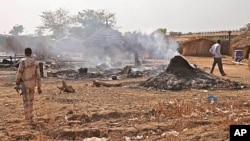The African Union on Tuesday gave Sudan and South Sudan 90 days to settle their disputes over oil, citizenship and boundary issues or face binding international arbitration. But, the ultimatum came amid more talk of war and an increase in border hostilities.
A ministerial-level session of the AU Peace and Security Council threatened to abandon its high-level Sudan mediation process unless the talks begin to show results.
The ultimatum signaled the continental body's frustration at the breakdown of negotiations led by former South African President Thabo Mbeki. The Mbeki panel talks collapsed this month as fighting erupted along the Sudan-South Sudan border.
Commissioner Ramtane Lamamra said that if the warring parties fail to resolve their disputes within three months, the panel would be disbanded. He said outstanding issues would then be settled by an unspecified arbitration process.
"Three months from now, the panel will be ending its mission by either bringing the parties to agree, to sign and to implement all that is needed to resolve all the issues at hand or by formulating a comprehensive report for the Peace and Security Council to endorse it, for the international community to support it as binding and final," said Lamamra.
But before the council's communique was issued, Sudan and South Sudan were suggesting that more talks about oil and borders were not the answer.
Sudan's Foreign Minister Ali Karti said that fighting must stop before talks can take place.
"We need focusing on problems on the ground," said Karti. "If on a daily basis our borders are attacked from within South Sudan, this couldn't be accepted. Talking about other issues like oil revenues, like borders - yes, these are important issues. But these are not the issues that will take both parties to an escalating war."
Karti rejected calls for an end to Khartoum's aerial bombing campaign, calling it a legitimate act of self-defense.
"If you have an action, you should have a reaction," he said. "It is in international law of the Security Council itself and of the U.N. itself that I have the right of self defense. If somebody is attacking me on daily basis, what should I do?"
South Sudan's Minister of Cabinet Affairs Deng Alor suggested it is time to move past the Mbeki mediation process. VOA obtained a copy of Alor's speech to the Peace and Security Council in which he said, “[I]t will not be enough to return to negotiations as they were.”
Speaking to reporters afterward, Alor suggested that the Mbeki panel has too little authority to force the warring neighbors to settle contentious issues.
"The only thing we said is the mediation mechanism has to be enhanced," said Alor. "It has to be supported by the international community, so that it moves ahead."
Alor accused Khartoum of using allegations of southern aggression as a pretext for avoiding negotiations.
"The government of Sudan was saying they would only go back to negotiations if the security issue is resolved, meaning that we in South Sudan admit that we are supporting rebellion in South Kordofan, in Blue Nile and Darfur - something we are not doing," he said.
A South Sudanese military spokesman reported that Sudanese warplanes continued their attacks this week, even after the south withdrew troops from a strategic oil center captured earlier this month.
The bombing runs intensified after the South Sudan stopped pumping oil through Sudan in January, accusing Khartoum of stealing hundreds of millions of dollars of oil revenue.
News
AU Gives Sudan, South Sudan 90 Days to Reach Peace Deal






